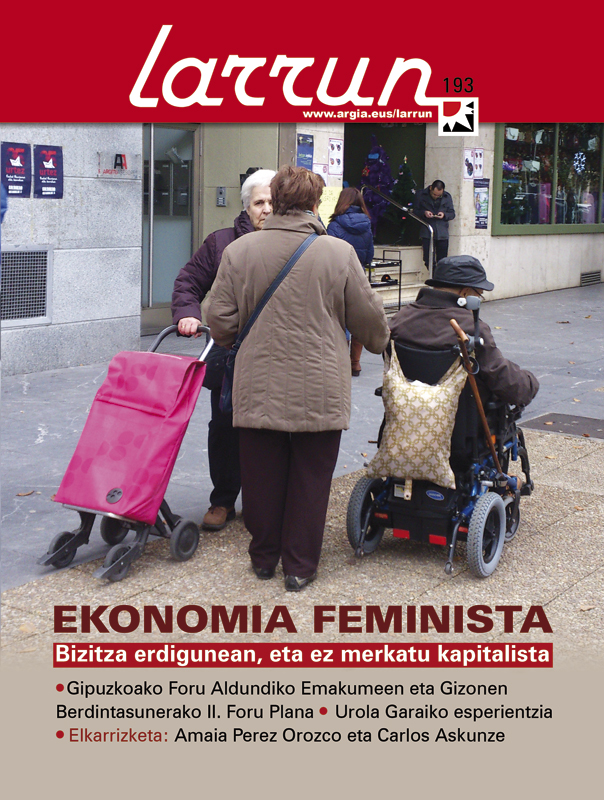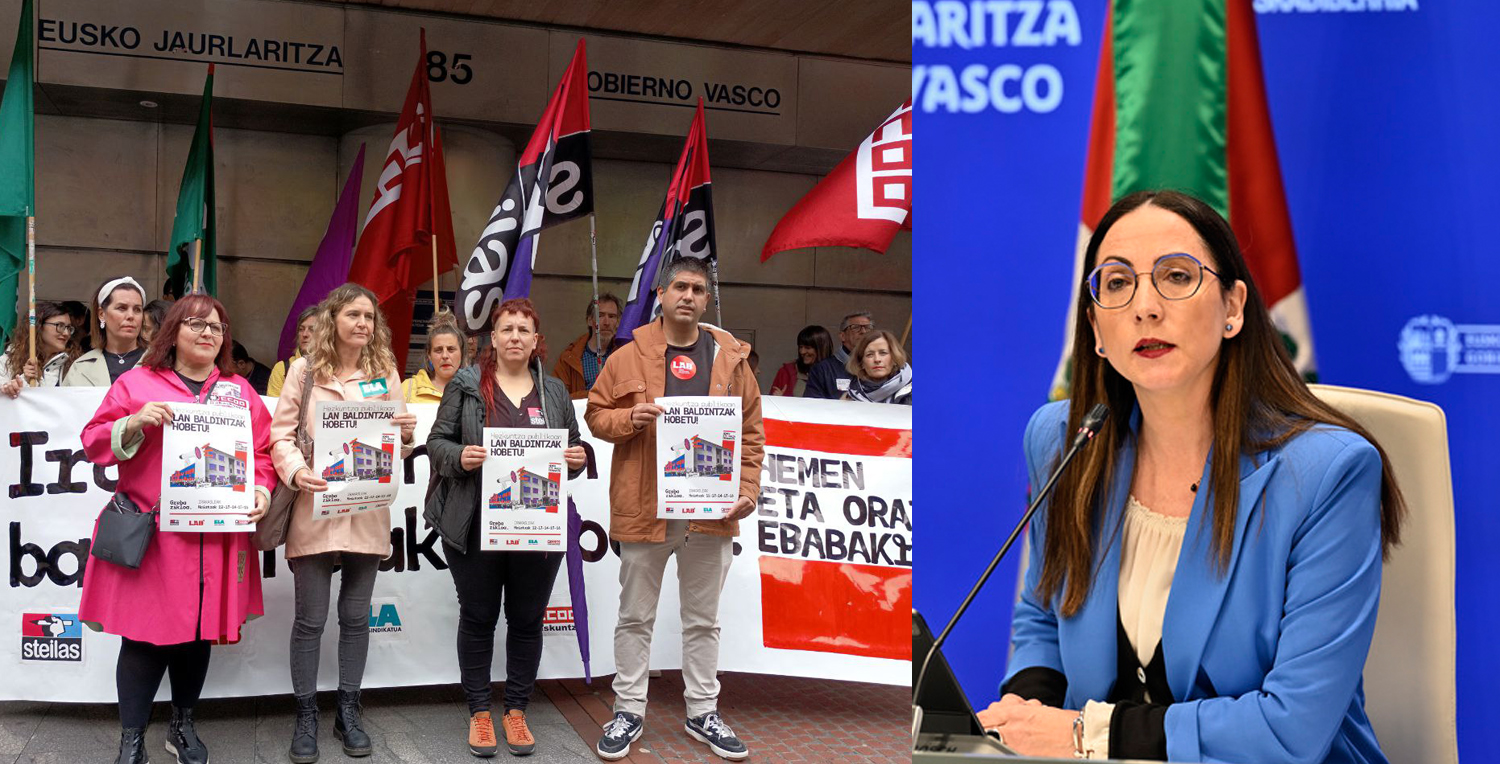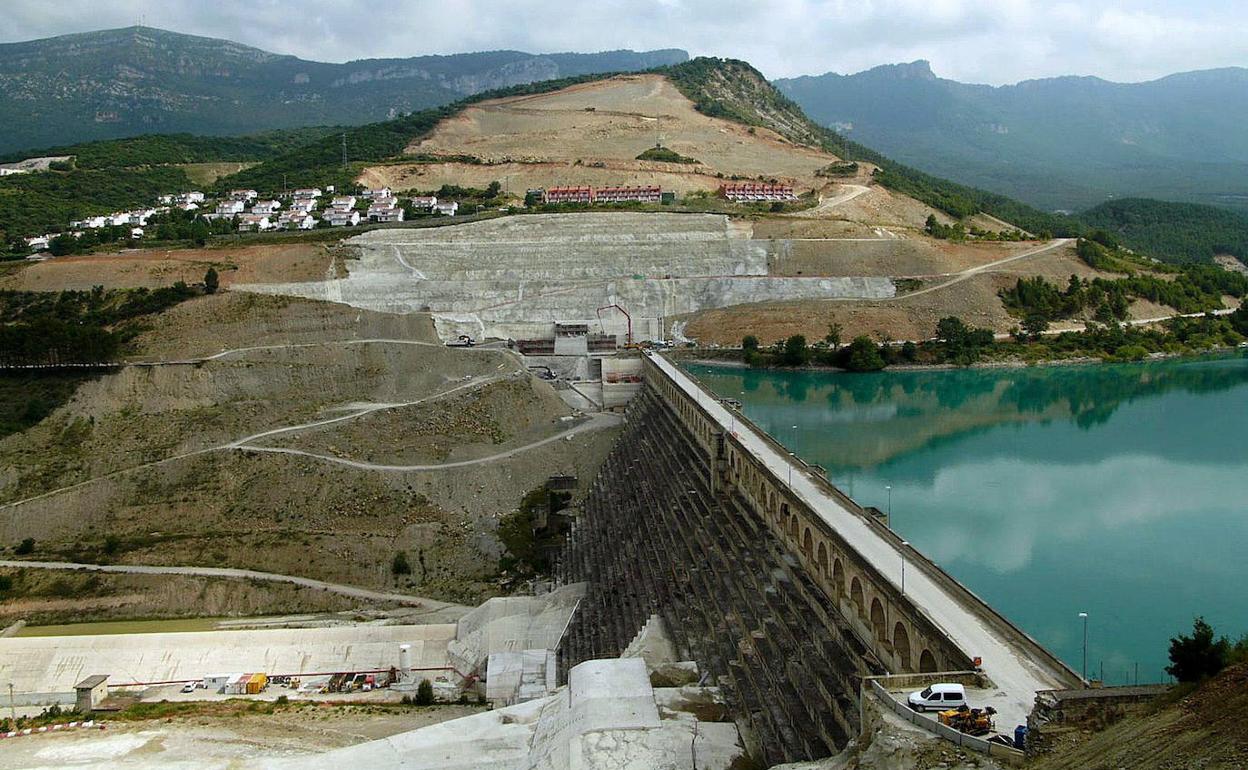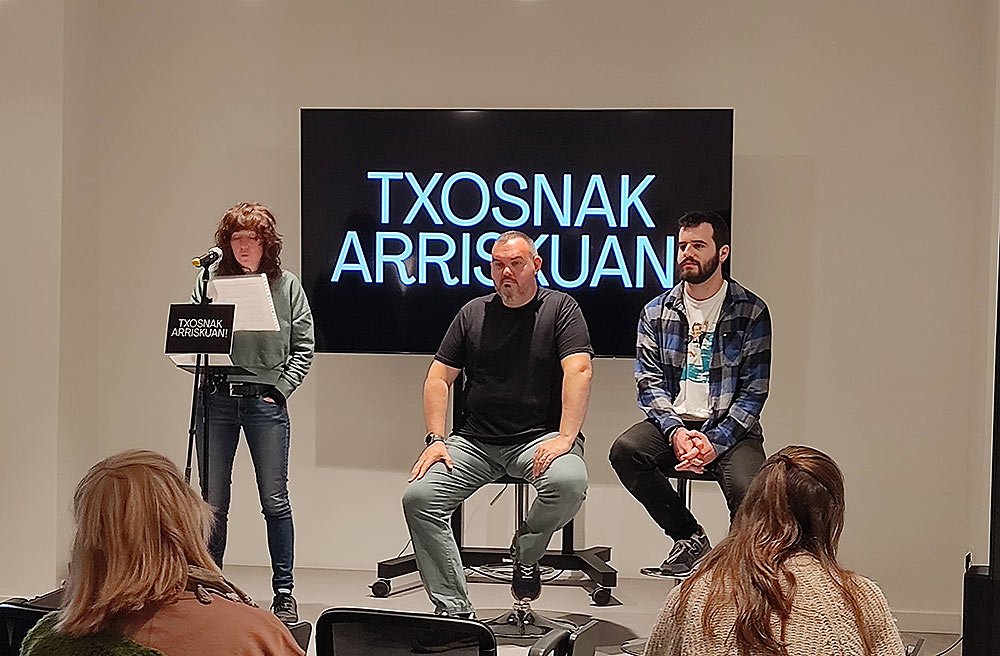The time to say what it is to live well
- We asked Amaia Pérez Orozco for an interview to talk about feminist economics. She did not accept the individual interview. I preferred to talk about the feminist economy and the solidarity and social economy. Both ways of understanding life are increasingly opening common paths. We have therefore also had Carlos Askunze as interlocutors.
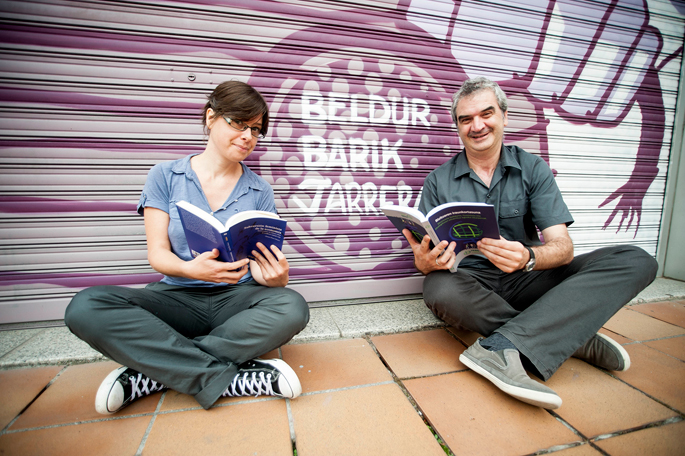
They propose a change of perspective: placing the sustainability of life at the centre. What's now in the middle?
Amaia Perez Orozco: There are processes of the capitalist market. In other words, how do we understand the world? We think that the economy is nothing more than money, that it is only where there are cash flows, that the only job is the one paid, that having well-being is consuming in the market. To give a small example of this way of organizing the world, the rhythms of time in life are marked by companies, not life itself. In the “crisis” it has been clearly seen that public resources have been used to recover market processes, markets determine how society should act. And if we go further, the markets are also at the heart of our political demands: the main objective is to demand a wage increase, or we only know how to call for employment. All these demands are based on the market. So we say that we have to change our minds, that instead of putting the market at the center, we have to put life. We have to realize that the economy is out of the market, that there is a lot of work that does not move money, that is not paid, but that is necessary for life. One thing is that the market influences life and another thing is that life is understood and organized through markets.
Carlos Askunze: REAS Euskadi [network of alternative and solidarity economy] Sustainability of life. The presentation of the book began with a clear allusion to the contributions made from the solidarity, feminist and ecological economy: people, peoples, humanity, should be responsible for making life sustainable in the future. Let life be regenerated in the future, a just, happy, pleasant life. But Amaia said that the market economy is at the heart of life (political, social, economic, individual) and not the other way around. The economy, sociology, politics and culture should be at the service of people to live in dignity and happiness, both the individual and the community. And all of that should be integrated into the environment.
A. Pérez Orozco: Putting the sustainability of life at the centre means more than one thing, from which point of view one looks. Environmentalism takes the planet into account and stresses that the system is attacking the planet. From feminism, we say: many hidden tasks keep life, we don't see them if we just look at the market. Feminism has been making hidden works visible, especially those carried out historically by women. In feminist reflection, however, we have taken a step further, and the only question we ask is not how we sustain life or how we destroy it, but how we refer to it. How should life be worth living? Where do we want to go as a human group?
The great C. Askunze: It is a question of priorities and objectives. Capitalism tells us that the main objective is to maximise profits over other costs: human costs, inequalities between peoples, environmental costs.
You think, then, that we can build another world. Should disaster be avoided, as Amaia says, in her book Feminist Subversion of the Economy (Dream Traffickers)?
The great C. Askunze: We have become accustomed to a kind of reading of the crisis, particularly from the institutions. We have been told that something in the economy has not worked very well, especially in finance. However, from critical economies it is said that something does not work before and that it leads to the crisis of civilisation. Capitalism has led us to a more global crisis, which has affected the environment, care, culture ...
A. Pérez Orozco: To refer to the world in which we live, we use the term capitalism, but not only capitalist, but also heteropatriarchal, colonialist, racist and environmentally devastating. I don’t know what we’ll call the capitaslima, I like to say “that scandalous thing.” It's a malicious system, which tells us what purpose, what way of life the human team has to be: individualist, consumerist, free head, that denies that we are part of a living planet and that makes us believe that nature is at our service. Some of these evil mechanisms, besides the capitalist, are very patriarchal, such as individualism and self-sufficiency. The system is in crisis because it's cunning and it attacks life. From the point of view of the markets, we are in crisis because they are no longer profitable, but if you look from the point of view of life, to stop being profitable does not have to be a problem. We have the problem that life is not moving forward.
They say we're on the move.
A. Pérez Orozco: The term movement [transit uses Spanish] comes from environmentalism, and change is going to be yes or yes. The world is already changing. The question is whether we want to regulate world change with criteria of justice or whether we leave it to market criteria.
The great C. Askunze: During the Valladolid conference, the contribution of feminism to the critical economy was analyzed. Mention was made, inter alia, of the need to read existing practices in the economic, political and social fields. It wasn't about believing that we have alternatives to bring all of those practices together and confront the capitalist model, but it was about a series of values to build a more sustainable, more self-managed, more cooperative, more ecological lifestyle.
A. Pérez Orozco: Doesn't the movement mean going beyond the choice of reform or revolution?
The great C. Askunze: Yes, of course.
A. Pérez Orozco: Reform=Exists. The revolution: We put the table upside down and we give a stroke of hand to start a new world. We want a new world, but we're making a way for that new world.
The great C. Askunze: The most practical essay is the one I mentioned. The reform left has ruled out that possibility, but I think we have to put that thought aside, it is very pessimistic and leaves you unwilling to do anything. In addition, there is no need to wait for the general power of the world, there are attempts at production, consumption, even finances that show that we can live differently.
Amaia, in the book entry, we explain two hypotheses. The first says that life is vulnerable and that we have to adapt to mutual protection. The second says that in order to live well we have to find a framework that serves us all, and that diversity must not lead to inequalities and exclusions.
A. Pérez Orozco: We want to put life at the center and ask ourselves what kind of life we want, but there are things that do or do. Basic living conditions are needed, life is vulnerable. So the only way to live is to live together with one another, so we say we have interdependence. And that is not misunderstood, it is not about breaking the ideal of individualism to build interdependence, but about breaking the ideal of individualism, precisely because that attitude denies that we have interdependence.
Could you give me an example of human dependence?
The issue that we've worked hard on feminism is care. Super autonomous, you feel super leader, because you've been trained, you've got careers, you've got master's degrees and you've gotten into the labor market. You're making the American dream come true, you're growing up, "I pay for a private pension plan, and I don't need anyone." Who cared for you when you were a child? And when you get older, who cares for you? What about when you get sick? And when you enter the labor market and you're going to dedicate your whole life to it, who will take care of your home, who will take care of your children if you have children? There's no mental sufficiency, you need others. What is more, with the conviction that they are only being flouted, it is denying the value of the aid it is receiving. I'm going further back, though maybe it's too basic. A model in which man and the wages that go to the labour market and women are dependent on him. We said that dependency is not real. The man needs the woman, as the woman needs that man. It's the relationship between those in need. But you can't see, man is the only one you see at work and woman is dependent. For this reason, men have the right to retirement, as well as men, and women have the right to widowhood, because they are derived, dependent. We've seen a lot in care, and now with the crisis, you see a lot of the trace of the American dream that a lot of people believed in. You see that life is broken, that the market sinks and you with it, and what's left for you? Family networks. There they protect you. And interdependence should not be solved in the family network, but in a much wider network. And you have to look at all the works that are put together and not deny some and overvalue others.
The great C. Askunze: Since we are born people we are dependent, we know, but we have been led to believe or we have believed that we are independent, for example, that we do not need natural resources. We need the environment, but we have not believed it. In care, we've had a lot of dependence, and especially women have done everything.
One of the biggest difficulties of capitalism is to believe that we are independent at all levels. We're also losing the spaces that we've shared. Before, the common space was the factory for the workers, now not. Neighborhoods were a space for communities. As Amaia says, when those spaces fall, and there are problems and crises, when you lose your job, you go back to your family; it seems to be the only community space you can stay in. Therefore, it is a question of reconstructing lives through interdependence, interdependence among people, interdependence with the environment…
A. Pérez Orozco: Life is interdependent, whether you want it or not. And how has society solved this issue? Denial of autonomy to some subjects, especially women. So, for a person to go to market, to supposedly be a very free person, and to keep himself and his family, what's behind? A woman sacrificed by others, doing free and without valuing a lot of care tasks. They have denied them autonomy to live, they have no financial autonomy, they have no social rights, they have no social recognition. Therefore, interdependence is solved at the expense of inequality and through the denial of the autonomy of many people. For feminism it is undeniable to maintain autonomy, because from many points of view the community is highly valued, but what community do we talk about, the community that controls, that does not let you enjoy your body? So how do we combine mutual need and personal autonomy? It seems to me that sometimes in social and solidarity economies the concept of autonomy is not strong enough, and feminism insists a lot on that idea.
You affirm that the new model of life that would be built would be a universal model and that it would take into account the peculiarities. What does this mean?
A. Pérez Orozco: The debate on how we want the world will not be done from the blank page, there are many critical looks that we are not willing to go through the red lines. We will have to discuss what life is worth living, we will have to find a new definition, but that will be valid if everyone can take advantage of it.
Please explain the red lines better.
A. Pérez Orozco: In this new definition, all citizens must have a place. For example, if the definition of life that is worth living includes having a household employee who washes my house every day, the world would be divided into two: the home employees and those who have home employees. Does all of this enter into the new definition of the life model? To give another example, is the life model that energy and natural resources need that will not be available to all? No. That is why it must be universal, good life cannot be for one and another. When we say that we have to take account of particularities, what we mean is that life is not the same for everyone, for all people, not all parts of the world. Differences and plurality must be respected. It wouldn't be a Stalinist model, now everybody with blue jersey. All of them equally.
The great C. Askunze: The red lines have to do with the rights of all people anywhere in the world: human rights, basic rights, water and education for all. Societies cannot be built from inequality, either within society, between men and women, between young people and the elderly, or between peoples. That's what we're talking about when we talk about red lines. The issue of consumption is clear, it is impossible. How many planets would everyone need to consume car, washing machine, electricity? It is not possible. Redistribution is needed.
A. Pérez Orozco: Another red line to which we have already referred. I have a great success in the labor market, I will dedicate my life to work… and as long as you are there, who will take care of all the other jobs that need to be done? Those ideals are impossible.
In Europe, academia is reflecting on the feminist economy and in South America they have returned to practice. Is that the case?
A. Pérez Orozco: In Europe, talking about the feminist economy seems to me to have come from academia. In South America, women speak more about the practices that are taking place in the economy. Today, the feminist economy is crossing the wall of academia and, moreover, weaving links with the social and solidarity economy. Many people in the social and solidarity economy are asking if their practices are feminists. On the other hand, academia is increasingly linked to the feminist movement. The feminist movement is making a critique of the system, and not from academia. Two years ago, I felt a crossroads, that is, it seemed to me that the feminist economy would stay in college. In 2007, when the "crisis" began, many feminists went to university in search of their opinion. And now no, now the feminist movement has its position on the “crisis.” In the face of the “crisis”, alternatives have been put on the table from the perspective of the feminist, social and solidarity economy, proposing initiatives. What do you think about Carlos?
The great C. Askunze: People are testing alternative forms of production, consumption, financing… The encounters that are being created lately between feminism and the solidarity economy have to do with that. They are no longer academic debates, we are discussing whether the practices we are carrying out are truly alternative, if they are alternatives in a global way, if they are alternatives from the feminist point of view, from the ecological point of view… On the other hand, there are spaces where the people of the academy meet with the militant movement and, therefore, are also militating these academics. Book for example [Sustainability of life. The contributions made from the Solidarity, Feminist and Ecological Economy], is the meeting point of all this. Before starting
the interview, you tell me that the solidarity economy and the feminist are feeding more and more. Proof of this is that you come to talk about the feminist economy and you meet together.
The great C. Askunze: In the first article of the book, Yolanda Jubeto and Esther Larrañaga state that the solidarity economy will not be solidary if it is not feminist. The contributions they have to make ecological and feminist economies are very important because they go to the root. We have talked about the crisis of civilisation, about disaster, because in order to change all that, we have to go back to the roots of economic, political and social functioning, and I think that this is what greens and feminism invent.
A. Pérez Orozco: They both go to the root and are often said to be utopian, abstract. On the contrary, the social and solidarity economy has made a special effort to develop concrete practices. The feminist and ecological economy in Europe has been more critical than concrete experiences.
The great C. Askunze: The social and solidarity economy is not a movement with well-defined borders, it is an open concept, which includes a lot of practices, among them very diverse. On the contrary, the green economy and the feminist economy have a tradition, an academy. Here is the meeting point, the social and solidarity economy has concrete practices and the ecological and feminist economy has radical approaches. Together, we can build something interesting.
2 Carlos Askunze 1 0 1 2 1 2 1 2 2 2 2 2 2 2 2. Member of REAS Euskadi (alternative and solidarity economy network).
BRN + Neighborhood and Sain Mountain + Odei + Monsieur le crepe and Muxker
What: The harvest party.
When: May 2nd.
In which: In the Bilborock Room.
---------------------------------------------------------
The seeds sown need water, light and time to germinate. Nature has... [+]







